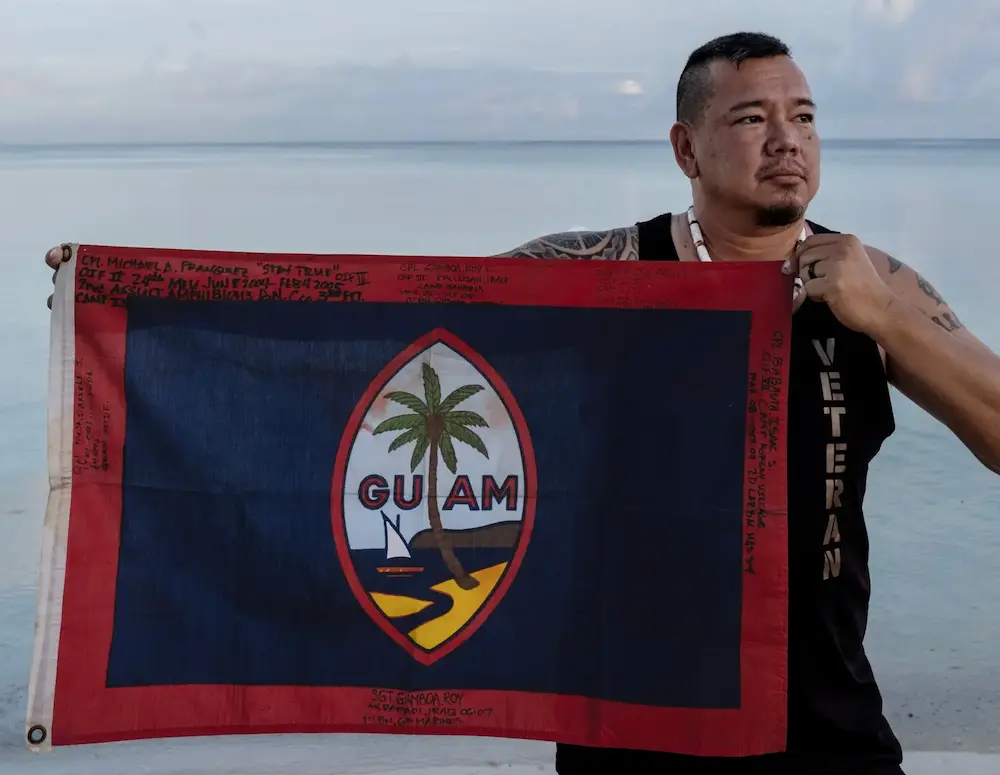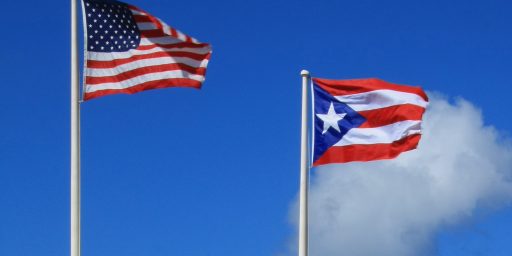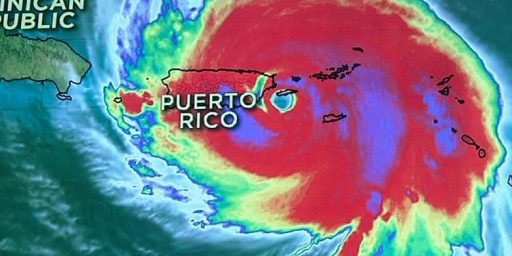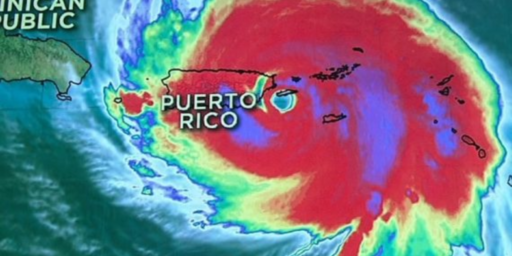America’s Forgotten Empire
Our Pacific territories are giving more than they're getting.

On my commute yesterday, I listened to the NYT Daily podcast‘s Sunday Read, “The America That Americans Forget.” It’s a literal reading of a July 7 article by Sarah Topol of the same name about Guam and other US territorial possessions in the Pacific, highlighting both their strategic importance to US national security and the incredibly undemocratic treatment they receive from the ostensible leader of the liberal world order.
The piece is intentionally anecdotal and unbalanced. Even so, it’s powerful and worth a read or listen.
The anecdotal nature of the piece defies excerpting but I’ll nonetheless give you a taste of the core arguments.
. . . Guam has become a strategic node in America’s designs in the Pacific. It is commonly referred to as “the tip of the spear” — a place from which the United States can project military might across Asia, an essential conduit to the first island chain of Japan, the Philippines and Taiwan and then on to China. As geopolitical tensions rise, Guam’s importance to American military planners only increases, and so does the risk to those who live there. In every iteration of war games between the United States and China run by the Center for Strategic and International Studies (C.S.I.S.), Beijing’s first strike on U.S. soil has been to bomb Guam.
Yet the island is largely forgotten by most Americans. Guam plays a central role in “homeland defense,” though it rarely shows up on maps or in textbooks about the homeland — no place tries harder to show its patriotism and gets so little recognition in return. The island is missing from many NGO and U.S. government lists — for example, a U.S.D.A. Economic Research Service poverty chart — while websites like those of Air France and the World Bank list Guam as a separate place entirely. The New York Times, like many other publications, did not include Guam or any American Pacific Island territory on the national Covid map.
[…]
America has long expected subservience from Guam. Over hundreds of years of colonization, the island has been used as an outpost, a naval base, a launching pad and a pawn. A poem people often cited to me about Guam is titled “My Island Is One Big American Footnote.”
Footnote or not, from the time of their acquisition Guam and the other territories exerted their own subtle influence on the United States. The country wasn’t colloquially referred to as “America” until 1898. Theodore Roosevelt popularized the term in speeches after the country became much greater than a federation of states. Three years after Manifest Destiny’s conquest of the American West ended, the country began to expand overseas. First, it took possession of dozens of uninhabited islands in the Caribbean and the Pacific, primarily for the harvesting of guano. The United States purchased Alaska from Russia in 1867. In 1893, Americans overthrew the monarchy in Hawaii, then later annexed the islands. In 1898, under the Treaty of Paris that ended the Spanish-American War, Spain sold the United States the Philippines for $20 million and included Puerto Rico and Guam for free. Wake Island and American Samoa followed in 1899, and the United States purchased the Virgin Islands in 1917. By the end of World War II, 135 million people lived under U.S. rule outside the continental United States; America’s overseas territories made up nearly a fifth of its land area, according to Daniel Immerwahr, associate professor of history at Northwestern University, in his book “How to Hide an Empire.”
[…]
The federal government’s expansive power over Guam exists because of a series of Supreme Court rulings called the Insular Cases that began in 1901, five years after the court allowed “separate but equal” segregation. The U.S. Congress already had plenary power over all American territories under Article IV, Section 3, Clause 2 of the Constitution, referred to as the Territorial Clause. In the Insular Cases, the court reasoned that certain U.S. territories were “inhabited by alien races,” so the full Constitution did not have to apply there, and they were not assumed to be on a path to statehood. As a result, any legislation passed by Guam’s local government can be overruled by Congress in perpetuity. The island is governed by consultation, not consent.
In 1946, eight United Nations member countries including the United States created a list of their territories “whose people have not yet attained a full measure of self-government,” in accordance with the U.N. Charter’s principle of self-determination. Guam is among the 17 that remain there today. Delegates from the Guam Decolonization Commission regularly travel to New York to appear before the United Nations Special Committee on Decolonization to bring attention to the failure of the self-determination process. Testimony is given by the Guam delegation, the U.S. government delegation and an independent expert, and results in a draft resolution. Every time the Guam delegation requests the United States allow a U.N. fact-finding mission to assess the colony’s trajectory toward self-determination, the request is denied.
As with Puerto Rico and the US Virgin Islands (but not American Samoa), residents of Guam and the Northern Mariana Islands are American citizens by birth. But, because they’re not states, they don’t have the right to vote for President and lack representation in Congress (unless they take up residency in one of the states). They’re much poorer than any of the 50 states but receive far less Federal assistance.
The anecdotal thread that ties the story together is about a Marine Corps veteran who gets very little in the way of needed assistance from the VA because it’s next to impossible to get service without flying to Hawaii, which is incredibly expensive to do. This, despite Guam having one of the highest concentrations of US military veterans in the country.
Complicating matters further is that the indigenous CHamoru people have become a minority in their homeland because the jobs created by US military bases have brought in so many expatriates. They’ve tried multiple times to have referenda to decide whether to apply for statehood, independence, or other options but the US courts have ruled that the 15th Amendment precludes restricting the vote on those issues to the CHamoru.
As with Puerto Rico, it’s not clear that the natives have a strong preference. There are advantages to territory status that would be lost with statehood and vice-versa. Similarly, while there’s a strong sentiment for independence, there’s also a strong sentiment for remaining tied to the United States.
Presuming they want it, the reasonable and decent thing to do would be to bring Guam and the Northern Mariana Islands, as well as any of the other three territories that want it, into the Union as states. But, as with DC, that’s severely complicated by both our tense domestic political situation and the inherent design flaw that comes with the Senate and Electoral College. Republicans will doubtless object to their coming into the union because they’re likely reliable Democratic votes. But, as a practical matter, all but Puerto Rico (~3.3 million) are simply too tiny to make any sense as states with two Senators. American Samoa and the Northern Marianas both have ~50,000 people and Guam a little over 150,000; even if we brought them in as a package, they’ve be half the size of the smallest existing state.





While I recognize the complexities (many of which are touched on in the OP), it is wholly indefensible that these American citizens have no access to meaningful representation.
The ongoing status of these locations and persons also heavily undercuts the US self-image of being neither a colonizer nor an imperial power.
We shouldn’t have second class citizens who have no representation. It’s just wrong. It’s bad for them, and it’s bad for our country as a whole.
Statehood or independence, I don’t really care which. Add them to Wyoming even.
(I’m also not convinced that any of these territories would be reliable Dem votes — the politics are a lot more complicated than skin tone. Guam has lots of veterans, Puerto Rico has lots of business interests, etc. Certainly places where Republicans could try to compete.)
Puerto Rico should obviously be a state, with two senators include.
Guam and the other Pacific territories too small to be state, but they should be able to send reps to the House.
How about grandfathering-in all the politicians elected from these places as barred from caucusing with any political party and from voting for Supreme Court justices until 2054 (or some other agreed-up date decades from now)? That would prevent immediate changes in the balance of power and maybe ease some partisan concerns.
My ex wife, who was born and grew up in New York State lived in Guam for 20 years ending in the early ’90s. She worked for the government as a probation officer. In 1975 when Saigon fell a 5 year old girl was evacuated from Vietnam to Guam along with several other children who were born in a Saigon whore house. Her mama was a local hooker and her daddy was a GI Joe. Several years later that young girl got in trouble with the law and my ex was her probation officer. I’m not sure of the sequence of events but when the girl was 14 she was raped and had an abortion. At one point the girl was in court and the Judge was ready to send her back to juvie hall as they called it. My ex was in the courtroom and voluntered to take the girl home with her. The judge agreed and eventually my ex adopted the girl.
By the time I met my ex she had been away from Guam for a year or two. Her adopted daughter was an adult and married with children. When I got married I was an instant father and grandfather. I thought that was pretty neat. Before we were married her daughter and husband, her three girls, the oldest 12 and an infant son and two girl cousins, 13 and 10 (?) (that adds up to two adults and 6 kids) got on a plane in Guam, flew to Hawaii then Los Angeles then stopped over in Houston and finally to Orlando, Florida. Compared to that journey it was a quick 900 mile jaunt to meet them at
Disney World. It was a happy reunion for my ex and her daughter and it was a joy for me to meet my new family. I still have pictures on my refrigerator door of me and the kids. After two days they began the long trip back to “Where America’s Day Begins”.
After several years my wife and I separated and then divorced. I tried to keep in touch with the family in Guam. I sent care packages and money to all of them on birthdays and holidays. I kept it up for three years. Never got an acknowledgement or a thank you. I know what happened. My ex filled her daughter’s head with lies about me and likely told her not to contact me. I finally gave up. The infant son is in his twenties by now and his oldest sister in her thirties.
I can only hope that their lives are going well.
At a bare minimum, we should amend the constitution to grant Guam, et al. at least one collective House seat and some EVs.
@Steven L. Taylor: Yup. The design flaws make me not want to admit as states places that I think deserve statehood, including DC. It’s a middle-sized city and shouldn’t have two Senators. But it should damn well have representation.
@James Joyner:
It’s a middle-sized city with more people than either Vermont or Wyoming, both which get two senators.
@Stormy Dragon: They got statehood in 1791 and 1890, when we were a fledgling and expanding country. It just makes no sense to add tiny states with two Senators at this point. Fewer people live in DC than in Nashville.
Maybe we should create a sub category of states that only get 1 senator and Rep. with the option to become afull state if population increases enough.
@James Joyner: But Wyoming was pretty obviously not going to become a metropolis.
And the number of Senators is by (poor) design not based on population, so that should not be an argument for or against admission.